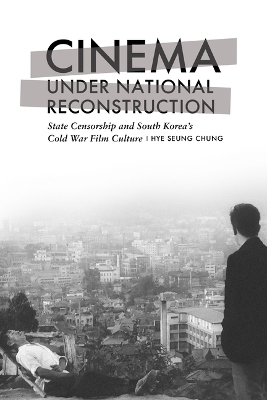
Cinema under National Reconstruction
Rutgers University Press (Verlag)
978-1-9788-3872-7 (ISBN)
- Noch nicht erschienen
- Versandkostenfrei
- Auch auf Rechnung
- Artikel merken
Cinema under National Reconstruction calls for a revisionist understanding of state film censorship during successive Cold War military regimes in South Korea (1961–1988). Drawing upon primary documents from the Korean Film Archive’s digitized database and framing South Korean film censorship from a transnational perspective, Hye Seung Chung makes the case that, while political oppression/repression existed inside and outside the film industry during this period, film censorship was not simply a tool for authoritarian dictatorship. Through such case studies as Yu Hyun-mok’s The Stray Bullet (1961), Ha Kil-jong’s The March of the Fools (1975), and Yi Chang-ho’s Declaration of Fools (1983), the author defines censorship as a dialogical process of cultural negotiations wherein the state, the film industry, and the public fight out a battle over the definitions and functions of national cinema. In the context of Cold War Korea, one cannot fully understand or construct film history without reassessing censorship as a productive feedback system where both state regulators and filmmakers played active roles in shaping the new narrative or sentiment of the nation on the big screen.
HYE SEUNG CHUNG is the co-author of Movie Minorities: Transnational Rights Advocacy and South Korean Cinema (Rutgers University Press, 2021) and Movie Migrations: Transnational Genre Flows and South Korean Cinema (Rutgers University Press, 2015), and the author of Hollywood Diplomacy: Film Regulation, Foreign Relations, and East Asian Representations (Rutgers University Press, 2020), Hollywood Asian: Philip Ahn and the Politics of Cross-Ethnic Performance, and Kim Ki-duk.
NOTE ON TEXT
CHRONOLOGY
A LIST OF AGENCIES AND ACRONYMS
INTRODUCTION: Archival Revisionism and New Korean Film Historiography
CHAPTER 1: Fending off Darkness, Uplifting National Cinema: Korean Film Censorship and The Stray Bullet
CHAPTER 2: From Blackboard Jungle to The Teahouse of the August Moon: Censoring Hollywood in Postcolonial Korea
CHAPTER 3: Myths of Martyrs and Heroes in a Godless Land: Interagency Regulation of 1960s Anticommunist Films
CHAPTER 4: Cinematic Censorship as Sentimental Education: Indoctrinating Gaiety as National Emotion in Yushin-Era Youth Comedies
CHAPTER 5: Censors as Audiences and Vice Versa: Sex, Politics, and Labor in 1981
CHAPTER 6: Beyond Oral Histories and Trade Legends: A Bourdieusian-Foucauldian Deconstruction of Anti-Censorship Myths
EPILOGUE: Media Ratings, the End of Censorship?
ACKNOWLEDGMENTS
INDEX
| Erscheint lt. Verlag | 15.11.2024 |
|---|---|
| Zusatzinfo | 24 B-W images |
| Verlagsort | New Brunswick NJ |
| Sprache | englisch |
| Maße | 156 x 235 mm |
| Gewicht | 481 g |
| Themenwelt | Kunst / Musik / Theater ► Film / TV |
| Geisteswissenschaften ► Geschichte ► Regional- / Ländergeschichte | |
| Sozialwissenschaften ► Kommunikation / Medien ► Medienwissenschaft | |
| Sozialwissenschaften ► Soziologie | |
| ISBN-10 | 1-9788-3872-7 / 1978838727 |
| ISBN-13 | 978-1-9788-3872-7 / 9781978838727 |
| Zustand | Neuware |
| Informationen gemäß Produktsicherheitsverordnung (GPSR) | |
| Haben Sie eine Frage zum Produkt? |
aus dem Bereich


